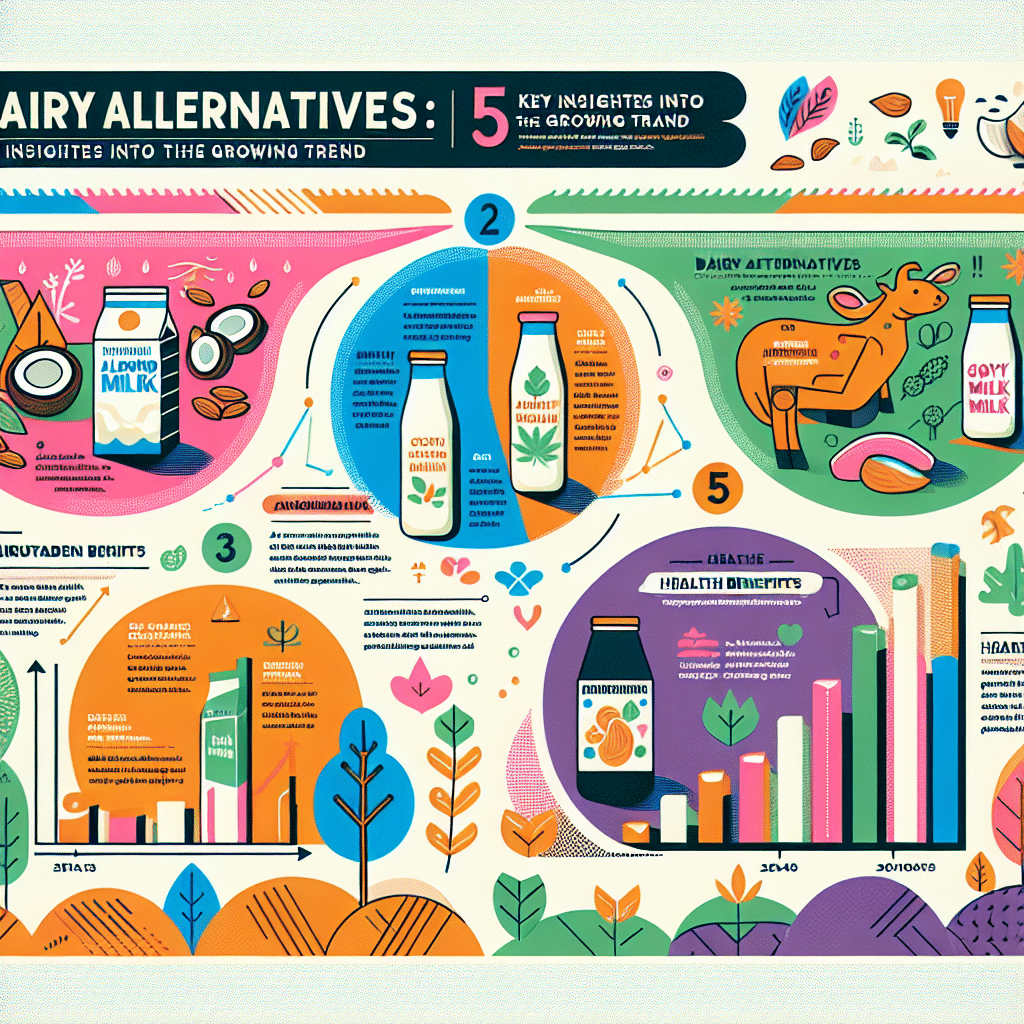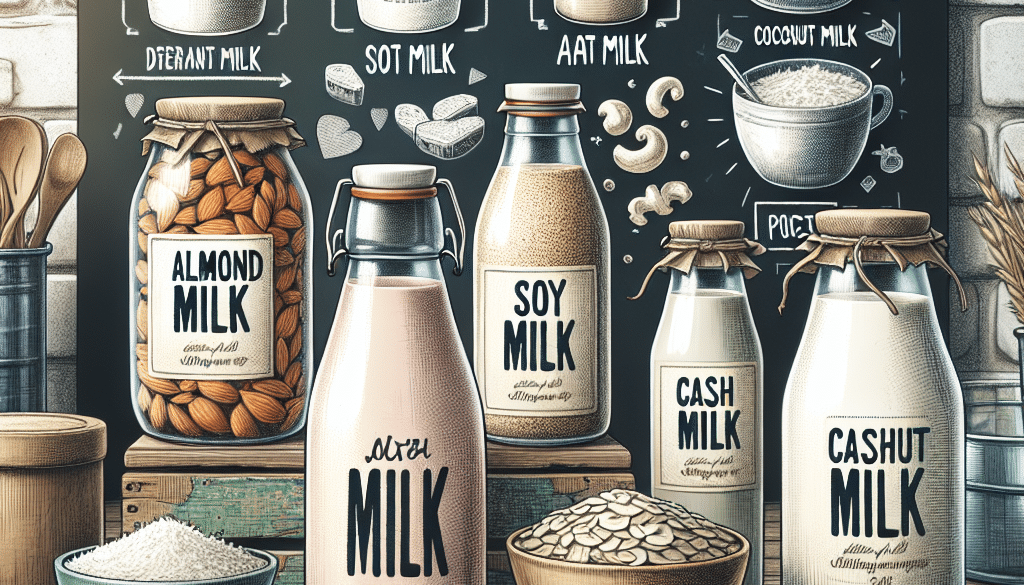Dairy Alternatives: 5 Key Insights into the Growing Trend
-
Table of Contents
- Dairy Alternatives: Exploring the Surge in Plant-Based Milk
- 1. Health Concerns and Dietary Restrictions
- 2. Environmental and Ethical Considerations
- 3. The Rise of Veganism and Flexitarian Diets
- 4. Innovation and Flavor Variety
- 5. Accessibility and Convenience
- Conclusion
- Discover ETChem’s Protein Products
Dairy Alternatives: Exploring the Surge in Plant-Based Milk

The rise of dairy alternatives has become one of the most significant trends in the food and beverage industry. As consumers become more health-conscious and environmentally aware, the demand for plant-based milk has skyrocketed. This article delves into five key insights that explain the growing trend of dairy alternatives, supported by relevant examples, case studies, and statistics.
1. Health Concerns and Dietary Restrictions
One of the primary drivers behind the surge in dairy alternatives is the increasing number of people with dietary restrictions and health concerns. Lactose intolerance, allergies to dairy proteins, and the desire for lower cholesterol and fat intake have led many to seek out plant-based options. Additionally, non-dairy milks often come fortified with vitamins and minerals, making them an attractive choice for those looking to boost their nutritional intake.
- Lactose intolerance affects a significant portion of the global population, with varying prevalence rates across different ethnic groups.
- Plant-based milks such as almond, soy, and oat are naturally lactose-free, catering to those with lactose intolerance.
- Case studies have shown that individuals with dairy allergies can safely consume most dairy alternatives, which do not contain casein or whey proteins.
2. Environmental and Ethical Considerations
Environmental sustainability and animal welfare are at the forefront of many consumers’ minds, influencing their dietary choices. The dairy industry is often criticized for its environmental impact, including greenhouse gas emissions, water usage, and land degradation. Plant-based milks typically have a lower environmental footprint, making them a popular choice for eco-conscious consumers.
- Almond milk production, for example, uses significantly less water than dairy farming.
- Oat milk is praised for its low greenhouse gas emissions compared to cow’s milk.
- Many consumers choose dairy alternatives to avoid supporting industries that they believe are harmful to animals.
3. The Rise of Veganism and Flexitarian Diets
The growing popularity of vegan and flexitarian diets has also contributed to the rise of dairy alternatives. As more people adopt plant-based diets for health, environmental, or ethical reasons, the demand for non-dairy products has increased. This trend is not limited to vegans; even those who occasionally consume animal products (flexitarians) are incorporating plant-based milks into their diets.
- Statistics show a steady increase in the number of people identifying as vegan or vegetarian in recent years.
- Flexitarian diets, which emphasize plant-based foods while allowing for occasional meat and dairy consumption, are becoming more mainstream.
- Food manufacturers are responding to this trend by expanding their range of dairy-free products.
4. Innovation and Flavor Variety
Innovation in the dairy alternative sector has led to a wide variety of flavors and formulations, attracting consumers who might not have considered plant-based milks in the past. From barista blends designed for coffee to chocolate and vanilla-flavored options, there is a dairy alternative for almost every taste and use.
- Brands are constantly developing new products, such as pea protein milk and flax milk, to capture a share of the market.
- Some dairy alternatives are formulated to mimic the creaminess and frothing capabilities of cow’s milk, appealing to coffee enthusiasts.
- Flavored options provide a sensory appeal that can entice children and those with a sweet tooth.
5. Accessibility and Convenience
The increased availability of dairy alternatives in supermarkets, coffee shops, and restaurants has made it easier for consumers to choose these options. As plant-based milks become more mainstream, they are no longer relegated to specialty stores and can be found alongside traditional dairy products.
- Major coffee chains now offer a variety of dairy-free milks, making it convenient for consumers to enjoy their favorite beverages.
- Supermarkets have expanded their dairy-free sections, often offering promotions and competitive pricing.
- Ready-to-drink dairy alternative beverages have become popular for on-the-go consumption.
Conclusion
In summary, the trend towards dairy alternatives is driven by a combination of health concerns, environmental and ethical considerations, the rise of veganism and flexitarian diets, innovation in the sector, and increased accessibility. As the market for plant-based milks continues to grow, we can expect to see even more variety and innovation in this space. Consumers now have a plethora of options to choose from, making it easier than ever to incorporate dairy alternatives into their daily lives.
Discover ETChem’s Protein Products
For those interested in high-quality protein products, ETChem offers a range of collagen solutions. Whether you’re developing food and beverage products, nutritional supplements, or health and wellness items, ETChem’s collagens can meet your needs. With a focus on quality and customer satisfaction, ETChem is the go-to source for protein ingredients.
About ETChem:
ETChem, a reputable Chinese Collagen factory manufacturer and supplier, is renowned for producing, stocking, exporting, and delivering the highest quality collagens. They include marine collagen, fish collagen, bovine collagen, chicken collagen, type I collagen, type II collagen and type III collagen etc. Their offerings, characterized by a neutral taste, instant solubility attributes, cater to a diverse range of industries. They serve nutraceutical, pharmaceutical, cosmeceutical, veterinary, as well as food and beverage finished product distributors, traders, and manufacturers across Europe, USA, Canada, Australia, Thailand, Japan, Korea, Brazil, and Chile, among others.
ETChem specialization includes exporting and delivering tailor-made collagen powder and finished collagen nutritional supplements. Their extensive product range covers sectors like Food and Beverage, Sports Nutrition, Weight Management, Dietary Supplements, Health and Wellness Products, ensuring comprehensive solutions to meet all your protein needs.
As a trusted company by leading global food and beverage brands and Fortune 500 companies, ETChem reinforces China’s reputation in the global arena. For more information or to sample their products, please contact them and email karen(at)et-chem.com today.




